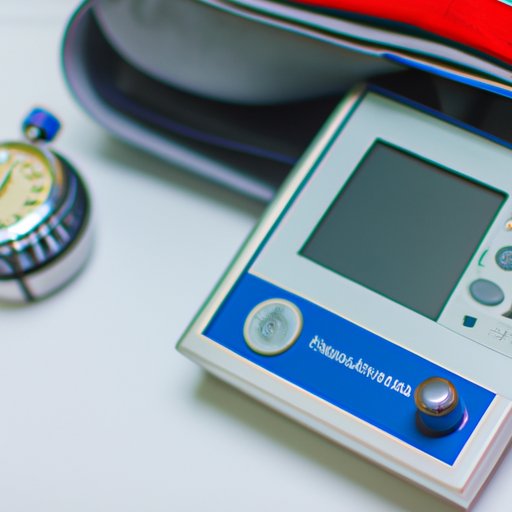
Introduction
High blood pressure during exercise is a common concern among athletes and fitness enthusiasts. It can be a sign of underlying health problems, and if left unchecked, it can lead to more serious health complications. In this article, we will explore the science behind blood pressure increase during exercise, its causes, consequences, and debunk some common myths about it. We will also provide practical tips to help readers understand how to manage their blood pressure during exercise for optimal health and fitness.
Understand the Connection between Exercise and Blood Pressure: Causes and Consequences
Blood pressure is the force of blood pushing against the walls of arteries and veins as it circulates through the body. It is measured in two numbers, systolic and diastolic, which reflect the pressure of the blood when the heart beats and when it rests. Exercise can cause blood pressure to increase due to various factors, including the intensity, duration, and type of exercise. High blood pressure during exercise can lead to various consequences, such as fatigue, shortness of breath, and dizziness.
Why Does Blood Pressure Spike during Exercise? What You Need to Know
Blood pressure increases during exercise because the body needs to deliver more oxygen to the muscles and organs that are working harder. The sympathetic nervous system, which is responsible for the “fight or flight” response, releases adrenaline and other stress hormones that cause the heart rate and blood pressure to increase. Different types of exercise, such as weight lifting or running, can affect blood pressure differently depending on the intensity and duration of the exercise.
The Science behind High Blood Pressure during Exercise: Unraveling the Mysteries
High blood pressure during exercise can result from various factors, including obesity, smoking, genetics, and other health conditions such as hypertension and diabetes. The cardiovascular system plays a critical role in regulating blood pressure during exercise by adjusting the blood vessel size and heart rate to match the body’s oxygen demand. Blood vessel function also influences blood pressure by affecting the resistance to blood flow. Scientific studies have shown strong evidence of the link between exercise and blood pressure, with regular exercise contributing to lower blood pressure and better cardiovascular health.
From Heart Rates to Blood Flow: A Comprehensive Guide to Blood Pressure during Exercise
Heart rate, blood flow, and blood pressure are all interrelated during exercise. As the heart rate increases, blood flow to the muscles and organs also increases, resulting in higher blood pressure. To manage blood pressure during exercise, it is important to monitor heart rate and blood pressure regularly and adjust the intensity and duration of exercise accordingly. Aerobic exercise, such as walking, cycling, and swimming, is highly recommended for managing blood pressure as it helps improve cardiovascular health and lower stress hormone levels.
How Exercise Affects Blood Pressure: Everything You Need to Know
To manage blood pressure during exercise, it is important to start slowly and increase the intensity gradually. Warm-up and cool-down exercises can also help prevent sudden spikes in blood pressure. It is crucial to maintain a healthy lifestyle, including a balanced diet, regular exercise, and stress management, to lower the risk of high blood pressure and other health complications. For those with pre-existing high blood pressure or other health conditions, it is essential to consult with a healthcare professional before starting any exercise program.
The Myths and Realities of Blood Pressure Increase during Exercise: What Experts Say
There are many myths surrounding blood pressure increase during exercise, including the belief that high blood pressure during exercise is normal and that weightlifting can cause permanent damage to blood vessels. However, these claims are not based on scientific evidence. In fact, regular exercise can help reduce blood pressure and improve cardiovascular health. It is important to debunk these myths to help people make informed decisions about their health and fitness.
Conclusion
High blood pressure during exercise can be a sign of underlying health problems, and it is essential to understand the science behind it and how to manage it effectively. By following the tips and guidelines outlined in this article, readers can take control of their blood pressure and optimize their health and fitness. Regular exercise, combined with a healthy lifestyle, can significantly improve cardiovascular health and reduce the risk of various health complications.




